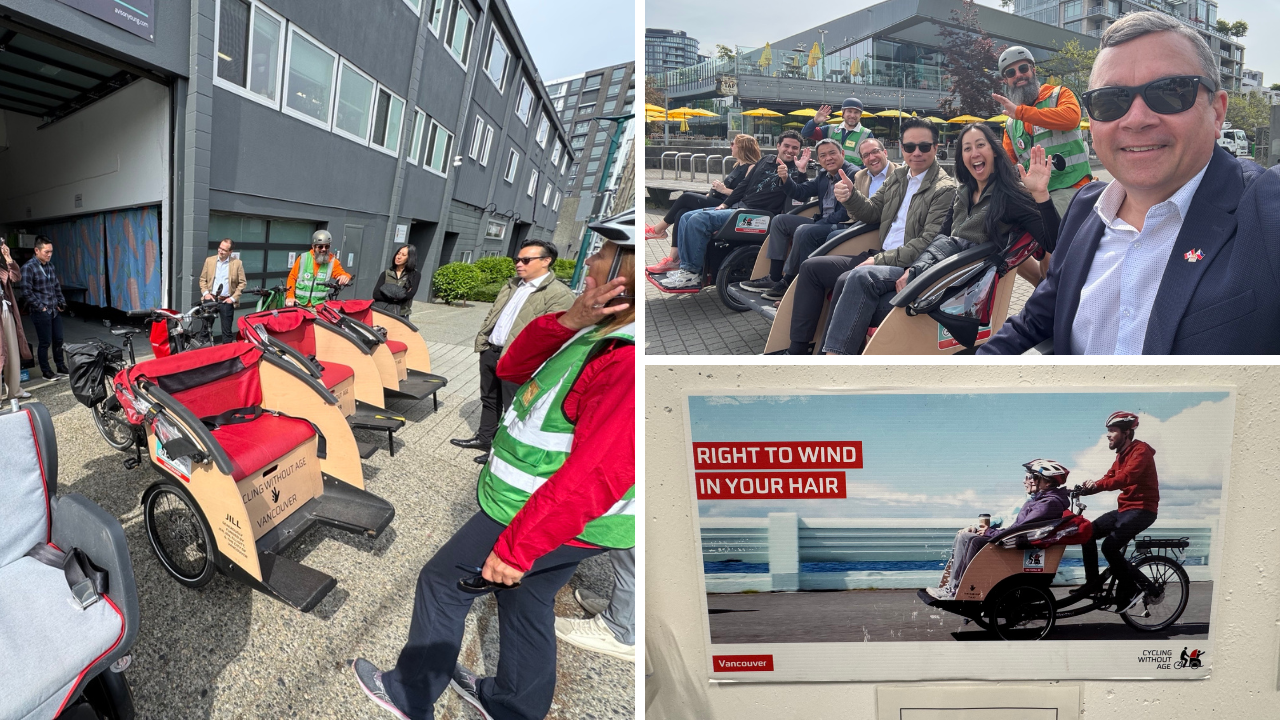By Councillor Mike Klassen
Recently, I had the pleasure of joining Mayor Ken Sim and my council colleagues Sarah Kirby-Yung and Lenny Zhou for a ride along Vancouver’s iconic seawall—not in a car or on bikes, but aboard a trishaw pedalled by the incredible local volunteers of Vancouver Cycling Without Age Society.
The experience was as uplifting as it was eye-opening.
As we glided along the shoreline path, strangers waved and smiled. It was a simple gesture, but a powerful one—reminding us how visible, appreciated, and human these rides make seniors feel. According to Jake Winn, Executive Director of Vancouver Cycling Without Age Society, this public response is typical.

“One of our passengers this week asked me, ‘Why is everyone waving at me?’” Jake told me in a follow-up interview. “I told her, ‘Because they are so happy to see you out enjoying yourself.’ Everyone smiles—the senior, the volunteer, and the people we pass. It’s a beautiful moment of recognition that this person is still here, still part of our community, and still deserves our love and care.”
These trishaw rides are more than just a recreational outing; they represent a shift in how we connect seniors to the world around them—and how we view their quality of life in long-term care.
Jake explained four key reasons why so many care homes are now partnering with Vancouver Cycling Without Age Society:
- Restoring Community Connection
“For seniors in care, the world they once knew can seem very far away,” Jake said. “A trishaw ride lets them revisit the places where they lived, worked, raised families. We’ve had riders pass a store and say, ‘That was my shop,’ or see a beach and say, ‘I used to sail right there.’ It re-establishes their place in the world.” - Offering Respite to Families and Staff
Staff and loved ones often focus so much on health needs that emotional well-being can fall by the wayside. “A ride provides a mental break. Families get to enjoy time outside with their loved ones. And during rides, staff know that several of their residents are out, cared for, and smiling,” Jake said. “It lifts the mood across the board.” - Therapeutic Benefits
Trishaw rides are more than feel-good moments—they have measurable health outcomes. “We’ve heard from care homes that residents eat more, sleep better, and are more socially engaged after their rides. Some have even seen reduced need for medication,” Jake shared. - Real Outdoor Access
“Many facilities have atriums or courtyards, but those are still enclosed,” said Jake. “We’re giving seniors access to the beach, the forest, the seawall—places they can’t get to otherwise. It’s real outdoor recreation, where they can feel the wind in their hair again.”
After just one ride, I was struck by how transformative the experience could be for someone who rarely leaves their facility. As policymakers, and as care providers, we have a duty to help our elders feel dignity, joy, and inclusion.
That’s exactly what Vancouver Cycling Without Age Society delivers.
To those working in seniors care, I encourage you to consider how this kind of partnership could bring new energy and connection into your residents’ lives. It’s not just a bike ride—it’s a pathway back to the community.
To learn more or to get involved, visit: Cycling Without Age Vancouver
***
Mike Klassen is a Vancouver City Councillor and former Vice President of Public Affairs for BC Care Providers Association




